6 Essential Vitamins For Women That You Need To Know About
By Dr. Charmi Shah +2 more

Get,

to manage your symptom
Get your,


4 Cr+ families
benefitted

OTP sent to 9988776655



You’ve successfully subscribed to receive
doctor-approved tips on
Whatsapp

Get ready to feel your best.

Hi There,
Download the PharmEasy App now!!


Register to Avail the Offer
Send OTPBy continuing, you agree with our Privacy Policy and Terms and Conditions

Hi There,
Sign up on PharmEasy now!!
Trusted by 4 crore+ families

OTP sent to 9988776655



You have unlocked 25% off on medicines




Code: NU25
By Dr. Charmi Shah +2 more
Table of Contents
Women are undoubtedly the backbone of the family. However, it is often seen that women pay more attention to their family’s requirements and ignore their own. However, we often forget that women are built differently and have special healthcare needs. Hence, they need to make smart dietary choices to meet their daily recommended intake1. Besides all macronutrients, there are some vitamins particularly important the female body. In this blog, we’ll have a look at these and share some dietary suggestions that will help boost these vitamins for women.
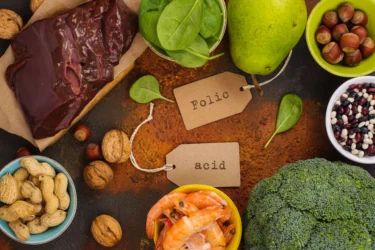
The B vitamin folic acid plays a key role especially for pregnant women or those planning to conceive. This vitamin may help in avoiding the risk of birth defects and preterm birth. It also helps in red blood cell production, lowering the risk of anaemia. Women planning pregnancy should take 400 mcg/day preconception and in early pregnancy2,3. Women with prior neural tube defect pregnancy may need a higher dose (4 mg/day). Although natural sources of folic acid include green leafy vegetables like spinach, legumes, broccoli, nuts and seeds, folic acid supplementation is necessary during pregnancy.
Every woman who could become pregnant should get 400 micrograms (400 mcg) of folic acid every day. The B vitamin folic acid helps prevent birth defects. If a woman has enough folic acid in her body before and while she is pregnant, her baby is less likely to have a major birth defect of the brain or spine like spina bifida.
Dr Ashish Bajaj, M.B.B.S., M.D. in Clinical Pharmacology and Toxicology

This vitamin is essential for making healthy red blood cells and its deficiency can lead to anaemia. Pernicious anaemia occurs when the body is unable to absorb this vitamin. Vitamin B12 also helps the body in keeping nerves healthy and in DNA synthesis. Vitamin B12 is found in animal products (meat, fish, eggs, dairy), and fortified foods. Vegetarian women are at higher risk of deficiency. Taking supplements might resolve this problem4.
Although all vitamins are essential and serve unique and important functions in the body, many health experts would agree that the three most important nutrients are vitamin D, B12, and iron as women are more prone to anaemia and osteoporosis.
Dr. M.G. Kartheeka, MBBS, MD(Pediatrics)
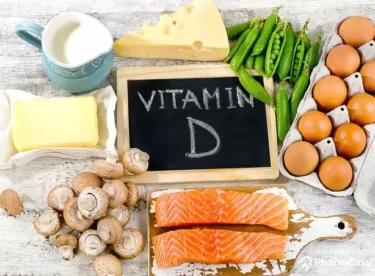
Bone health is often compromised in women. Especially post menopause, women become deficient in the hormone oestrogen that leads to a loss of the calcium content from bones. Vitamin D is essential for our body, as it helps to absorb calcium and thus its levels should be adequate to ensure stronger bones5. Vitamin D is found in dairy products in small amounts, but mostly, our skin produces it from the sun1. Despite sun exposure, Vitamin D deficiency is also seen in Indian women. Soak in some early morning sun for 30 minutes to get your daily dose of vitamin D. The recommended dose for Vitamin D supplementation is 600IU. Your healthcare practitioner may recommend a higher amount if you have significant Vitamin D deficiency6.
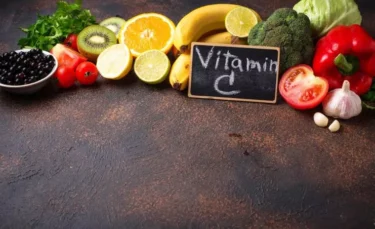
It helps the body make collagen, which is essential for the skin, cartilage, tendons, ligaments, and blood vessels. It helps in healing wounds and repairing teeth and bones. It boosts iron absorption, important for women with heavy menstrual bleeding who are prone to anaemia7. It is found in citrus fruits like oranges, lemon, sweet lime, amla, and Brussels sprouts.
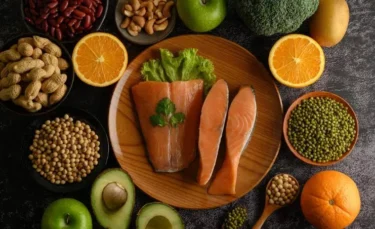
This vitamin is required for healthy teeth and soft tissues. Additionally, it is also essential for vision, immunity, skin, and reproductive health. Although this vitamin helps avoid risk of night blindness in mother and baby, excess of vitamin A (retinol form, not beta-carotene) in pregnancy can cause birth defects8. Discuss with your gynaecologist if you are on these supplements and planning to get pregnant. It is found in all yellow-green vegetables like mangoes, papayas, spinach, apricots, and carrots as well as egg yolk, milk9.
Also Read: Best Estrogen Rich Foods to Support Estrogen Levels Naturally
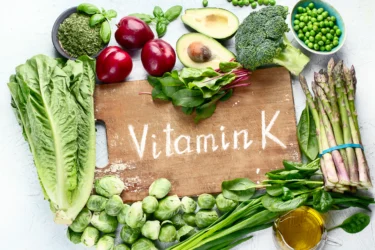
This vitamin is essential for blood coagulation and bone health. Our intestines also produce vitamin K required by our body. In women, this vitamin plays an essential role during pregnancy and childbirth by avoiding the risk of haemorrhage. It is found in green leafy vegetables (spinach, kale, broccoli). Therefore, adding these foods to your menu can fulfil your requirements abundantly10.
Although all these vitamins are essential for women, iron is one mineral whose role cannot be missed when talking of women’s health. Iron is very important for women as it helps maintain their menstrual cycles and hormonal balance. Its deficiency can cause anaemia, especially in women with heavy menstrual bleeding. Iron intake is crucial during pregnancy for proper foetal development and avoiding birth complications11. Iron is found in red meat, poultry, fish, green leafy vegetables, legumes (better absorbed with Vitamin C)12. The daily iron requirement for non-pregnant women is 18mg while WHO recommends 30–60 mg elemental iron daily during pregnancy2.
Note: Self-supplementation can be harmful; always consult a doctor before starting high-dose vitamins.
Commonly searched products containing multivitamins:
Also Read: How to Stop Bad Period Smell: Research-Based Tips and Home Remedies
Although all vitamins are essential and serve unique and important functions in the body, the above mentioned vitamins are especially important for women’s health as they are helpful with high-risk conditions (in women) like anaemia and osteoporosis. These may be needed during pregnancy also to prevent certain risks to the mother and the baby. Nonetheless, eating healthy is the first step in staying healthy. Cutting down on junk food and adding fresh fruits, vegetables, and nuts to your diet can help prevent nutrient deficiencies and embark your journey towards a healthy life.
Also Read: 10 Best Intimate Tips For Women To Keep Them Healthy
1. CDC. Healthy Eating Tips [Internet]. Nutrition. CDC; 2024. Available from: https://www.cdc.gov/nutrition/features/healthy-eating-tips.html
2. World Health Organization. Daily Iron and Folic Acid Supplementation during Pregnancy [Internet]. www.who.int. 2023. Available from: https://www.who.int/tools/elena/interventions/daily-iron-pregnancy
3. Folic Acid and Birth Defect prevention: MedlinePlus Medical Encyclopedia [Internet]. medlineplus.gov. Available from: https://medlineplus.gov/ency/article/002092.htm
4. National Institutes of Health. Office of Dietary Supplements – Vitamin B12 [Internet]. Nih.gov. National Institutes of Health; 2024. Available from: https://ods.od.nih.gov/factsheets/VitaminB12-HealthProfessional/
5. Khadilkar A, Mandlik R. Epidemiology and treatment of osteoporosis in women: an Indian perspective. International Journal of Women’s Health [Internet]. 2015 Oct;841. Available from: https://www.ncbi.nlm.nih.gov/pmc/articles/PMC4621228/
6. National Institutes of Health. Vitamin D [Internet]. National Institutes of Health. 2022. Available from: https://ods.od.nih.gov/factsheets/VitaminD-Consumer/
7. Medline Plus. Vitamin C: MedlinePlus Medical Encyclopaedia [Internet]. Medlineplus.gov. 2023. Available from: https://medlineplus.gov/ency/article/002404.htm
8. MedlinePlus. Vitamin A: MedlinePlus Medical Encyclopedia [Internet]. Medlineplus.gov. 2023. Available from: https://medlineplus.gov/ency/article/002400.htm
9. National Institutes of Health. Office of Dietary Supplements – Vitamin a [Internet]. National Institutes Of Health. 2022. Available from: https://ods.od.nih.gov/factsheets/VitaminA-Consumer/
10. Mathews N, Catherine. Vitamin K Deficiency: Diagnosis and Management. Annals of Laboratory Medicine. 2025 Apr 24. Available from: https://pmc.ncbi.nlm.nih.gov/articles/PMC12187499/
11. National Institutes of Health. Iron: Fact Sheet for Health Professionals [Internet]. National Institutes of Health. 2024. Available from: https://ods.od.nih.gov/factsheets/Iron-HealthProfessional
12. Better Health Channel. Iron and Iron Deficiency [Internet]. Vic.gov.au. 2022. Available from: https://www.betterhealth.vic.gov.au/health/conditionsandtreatments/iron
Disclaimer: The information provided here is for educational/awareness purposes only and is not intended to be a substitute for medical treatment by a healthcare professional and should not be relied upon to diagnose or treat any medical condition. The reader should consult a registered medical practitioner to determine the appropriateness of the information and before consuming any medication. PharmEasy does not provide any guarantee or warranty (express or implied) regarding the accuracy, adequacy, completeness, legality, reliability, or usefulness of the information; and disclaims any liability arising thereof.
Links and product recommendations in the information provided here are advertisements of third-party products available on the website. PharmEasy does not make any representation on the accuracy or suitability of such products/services. Advertisements do not influence the editorial decisions or content. The information in this blog is subject to change without notice. The authors and administrators reserve the right to modify, add, or remove content without notification. It is your responsibility to review this disclaimer regularly for any changes.
Comments

Leave your comment...
You may also like
Comments